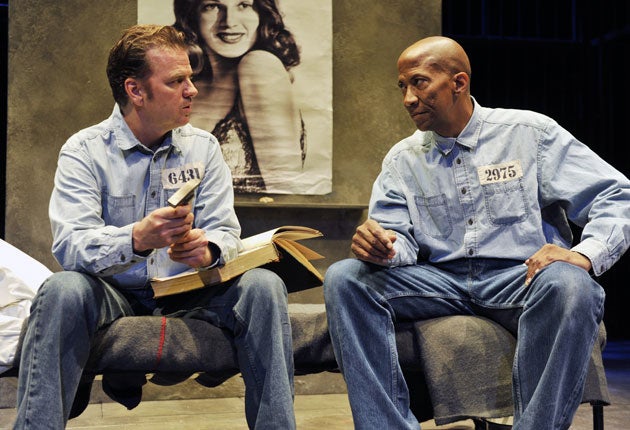The Shawshank Redemption, Wyndhams Theatre, London
Transfer from screen to stage is hard labour

Your support helps us to tell the story
From reproductive rights to climate change to Big Tech, The Independent is on the ground when the story is developing. Whether it's investigating the financials of Elon Musk's pro-Trump PAC or producing our latest documentary, 'The A Word', which shines a light on the American women fighting for reproductive rights, we know how important it is to parse out the facts from the messaging.
At such a critical moment in US history, we need reporters on the ground. Your donation allows us to keep sending journalists to speak to both sides of the story.
The Independent is trusted by Americans across the entire political spectrum. And unlike many other quality news outlets, we choose not to lock Americans out of our reporting and analysis with paywalls. We believe quality journalism should be available to everyone, paid for by those who can afford it.
Your support makes all the difference.It was always only a matter of time before theatre producers tried to cash in on the huge popularity of the 1994 prison movie, The Shawshank Redemption, now regularly voted one of the best-loved films in cinema history. It's not hard to account for its mass appeal. It may be sentimental and riddled in glaring implausibilities (there's a hole in the escape-plot the size of the one behind the Rita Hayworth poster), but it has a sturdy sincerity that steadily wears down cynicism. We long to believe in its hymn to hope and friendship and its conviction that patience, self-belief and intelligent integrity can triumph over corrupt authority.
So there's certainly a large potential market for a stage version, but is there any artistic justification? Not really, in this attempt which has just arrived in the West End from its premiere in Dublin. The writers, Owen Neill and Dave Johns, have argued that theatre is a medium that uses metaphor better than film. Their handling of this resource is shaky and limited. Andy, the banker banged up for life for a murder he did not commit, here sculpts model butterflies with his rock-hammer.
This results in disappointingly flimsy symbolism that's designed to cover for the fact that you can't show a man crawling down miles of sewage pipe on stage. Removing the flashback scenes and confining the action within bars is doubtless meant to reinforce the (tendentious) sense that prison is an emblem of the human condition. But the gravity of this notion is undermined by Ferdia Murphy's set which looks like a giant budgie cage.
Crucially lacking is any palpable feel of the slow passage of time. You need to credit that Andy holds on to his hope through two decades of rapes, beatings, and money-laundering for the devious warden. But Peter Sheridan's production never finds the right recurring rhythms with which to convey this. Populated by unageing, ever-energetic cons, the entire feat of endurance seems to last for 12 months, tops.
Another drawback is that the creators of this piece have the rights only to the Stephen King novella on which the movie was based. Warner Brothers won't let them include moments invented for the film. Happily, it can't prevent them from casting a black actor as Red, the likeable long-term inmate and prison-fixer who, in the original book, is a greying Irishman. In movie and play, Shawshank penitentiary seems blessed with a statistically startling absence of overt racists, but the black/white divide between Red and Andy implicitly enhances our sense of the scale of what is resolved in their maturing, mutually redemptive friendship.
The pair's rapport is never as heart-snagging here as in the movie, though the production postpones the climactic reunion to the curtain call and a touchingly jokey will-they-won't-they hug by the two fine actors. As projected by Kevin Anderson, the "inner light" that is supposed to glow from Andy's proud self-reliance looks too like the aloofness of someone coping with stomach ache during the earlier scenes, but his performance gains in sympathy thereafter.
In the role of Red, the excellent Reg E Cathey (of Wire fame) has Morgan Freeman's twinkle and rumbling, gravelly strength. Whether leading the prisoners in song after the unlooked-for grace of a bottle of beer or bravely raising his arms to embrace an uncertain post-prison future, he holds the evening together with his moving, unforced dignity.
Join our commenting forum
Join thought-provoking conversations, follow other Independent readers and see their replies
Comments